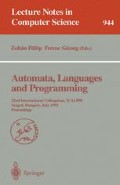Abstract
Measure and category (or rather, their recursion theoretical counterparts) have been used in Theoretical Computer Science to make precise the intuitive notion “for most of the recursive sets.” We use the notions of effective measure and category to discuss the relative sizes of inferrible sets, and their complements. We find that inferrible sets become large rather quickly in the standard hierarchies of learnability. On the other hand, the complements of the learnable sets are all large.
Supported in part by NSF Grant CCR 92-53582.
Supported in part by Latvian Council of Science Grant 93.599 and NSF Grant 9119540.
Supported in part by NSF Grant 9301339.
Supported in part by NSF Grants 9119540 and 9301339.
Supported by the Deutsche Forschungsgemeinschaft (DFG) Grant Me 672/4-2.
Preview
Unable to display preview. Download preview PDF.
References
D. Angluin and C. H. Smith. Inductive inference: Theory and methods. Computing Surveys, 15:237–269, 1983.
J. Barzdins. Two theorems on the limiting synthesis of functions. In Barzdins, editor, Theory of Algorithms and Programs, volume 1, pages 82–88. Latvian State University, Riga, U.S.S.R., 1974.
L. Blum and M. Blum. Toward a mathematical theory of inductive inference. Information and Control, 28:125–155, 1975.
E. Borel. LeÇons sur les fonctions de variables réeles. Gauthier-Villars, Paris, 1905.
E. Borel. LeÇons sur la théorie des fonctions. Gauthier-Villars, Paris, 1914.
J. Case and C. Smith. Comparison of identification criteria for machine inductive inference. Theoretical Computer Science, 25(2):193–220, 1983.
R. Daley, B. Kalyanasundaram, and M. Velauthapillai. Breaking the probability 1/2 barrier in fin-type learning. Proceedings of the Fifth Annual Workshop on Computational Learning Theory, pages 203–217, ACM Press, 1992.
R. Daley, B. Kalyanasundaram, and M. Velauthapillai. Capabilities of fallible finite learning. Proceedings of the Sixth Annual Workshop on Computational Learning Theory, pages 199–208, ACM Press, 1993.
R. Daley, L. Pitt, M. Velauthapillai, and T. Will. Relations between probabilistic and team one-shot learners. Proceedings of the Fifth Annual Workshop on Computational Learning Theory, pages 228–239, Morgan Kauf-mann Publishers, 1992.
S. Fenner. Notions of resource-bounded category and genericity. Proceedings of the Sixth Annual Conference on Structure in Complexity Theory, pages 196–212. IEEE Computer Soceity, 1991.
R. Freivalds, M. Karpinski, and C. Smith. Co-learning of total recursive functions. Proceedings of the Seventh Annual Workshop on Computational Learning Theory, pages 190–197, ACM, 1994.
E. M. Gold. Language identification in the limit. Information and Control, 10:447–474, 1967.
W. Gasarch and C. H. Smith. Learning via queries. Journal of the ACM, 39(3):649–675, 1992. A shorter version is in 29th FOCS conference, 1988, pp. 130–137.
S. Jain and A. Sharma. Finite learning by a team. Proceedings of the Third Annual Workshop on Computational Learning Theory, pages 163–177, Morgan Kaufmann Publishers, 1990.
C. Kuratowski. Topologie Vol. 1, 4th edition, volume 20 of Monografie Matematyczne, Panstwowe Wydawnictwo Naukowe, 1958.
L. Lisagor. The Banach-Mazur game. Translated Version of Matematicheskij Sbornik, 38:201–206, 1981.
J. Lutz. Almost everywhere high nonuniform complexity. Journal of Computer and Systems Science, 44:226–258, 1992.
J. Lutz. The qualitative structure of exponential time. In Proceedings of the Eighth Annual Conference on Structure in Complexity Theory Conference, pages 158–175. IEEE Computer Society, 1993.
K. Mehlhorn. On the size of sets of computable functions. Proceedings of the Fourteenth Annual Symposium on Switching and Automata Theory, pages 190–196, IEEE Computer Soceity, 1973.
M. Machtey and P. Young. An Introduction to the General Theory of Algorithms. North-Holland, New York, 1978.
D. N. Osherson, M. Stob, and S. Weinstein. Aggregating inductive expertise. Information and Control, 70:69–95, 1986.
J. Oxtoby. Measure and Category. Springer-Verlag, 1971.
L. Pitt. Probabilistic inductive inference. Journal of the ACM, 36(2):383–433, 1989.
L. Pitt and C. Smith. Probability and plurality for aggregations of learning achines. Information and Computation, 77:77–92, 1988.
H. Putnam. Probability and confirmation. In Mathematics, Matter and Method, volume 1. Cambridge University Press, 1975.
C. H. Smith. The power of pluralism for automatic program synthesis. Journal of the ACM, 29(4):1144–1165, 1982.
C. Smith. A Recursive Introduction to the Theory of Computation. Springer-Verlag, 1994.
M. Velauthapillai. Inductive inference with a bounded number of mind changes. Proceedings of the Second Annual Workshop on Computational Learning Theory, pages 200–213, Palo, Morgan Kaufmann, 1989.
Author information
Authors and Affiliations
Editor information
Rights and permissions
Copyright information
© 1995 Springer-Verlag Berlin Heidelberg
About this paper
Cite this paper
Fortnow, L. et al. (1995). Measure, category and learning theory. In: Fülöp, Z., Gécseg, F. (eds) Automata, Languages and Programming. ICALP 1995. Lecture Notes in Computer Science, vol 944. Springer, Berlin, Heidelberg. https://doi.org/10.1007/3-540-60084-1_105
Download citation
DOI: https://doi.org/10.1007/3-540-60084-1_105
Published:
Publisher Name: Springer, Berlin, Heidelberg
Print ISBN: 978-3-540-60084-8
Online ISBN: 978-3-540-49425-6
eBook Packages: Springer Book Archive

